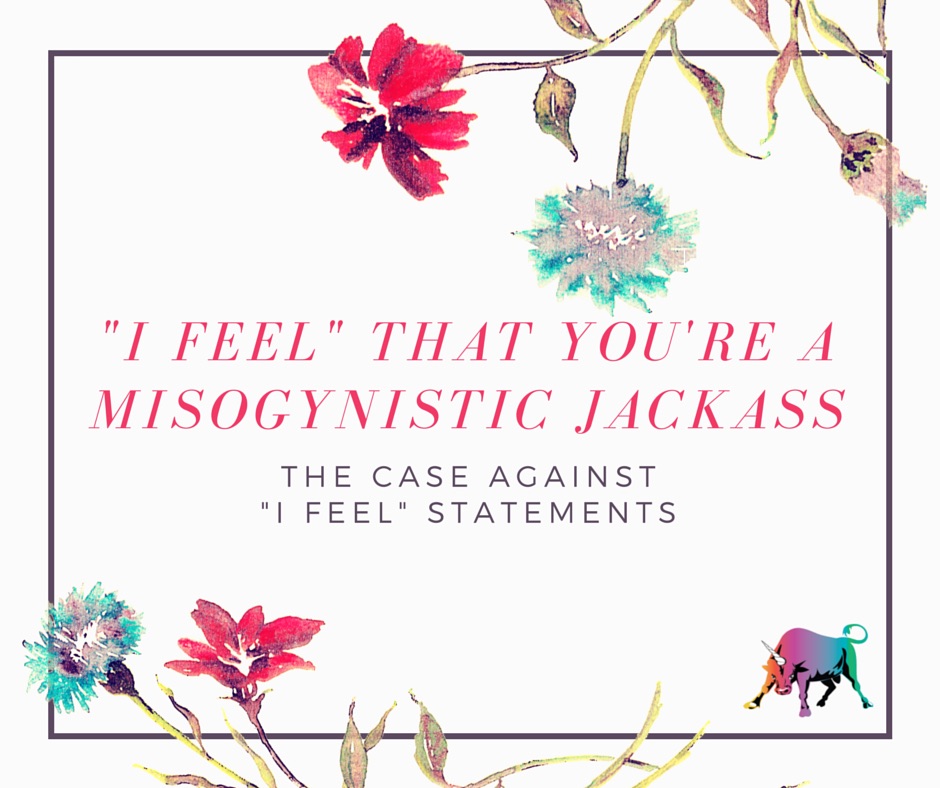In the post Bullish Q&A: What To Do About Your Awful Sexist, LGBT-Phobic “Friend”, I wrote, as advice to a woman who wished she had said something at the time when her friend made terrible comments:
Since you let the chat go by without saying anything this time, send him a very short message that says something like, “Hey, last time we talked you said some things I found pretty troubling. Just so you know, I obviously think men and women can do the same parenting jobs (and regular jobs), and I support LGBT people.”
He might just ignore it or reply “Sorry lol” (and change his opinion a little bit without mentioning it to you). Or he might want to talk about it. Or he might say something awful and then you defriend him.
Note that “your comments are troubling” is non-gendered, whereas “I’m upset” and “I’m offended” are gendered, and may prompt a misogynist to try to put the problem back on you.
A commenter on Facebook quoted this last part, and noted:
I found this so interesting, because my whole life I have been reading advice to phrase concerns as ‘I Statements’ or even better ‘I FEEL Statements’ to resolve conflict in the best possible way….
I think a lot of women have gotten that message, and I want to correct A GRAVE FUCKING MISCONCEPTION.
“I feel” language came out of relationship counseling. It’s for someone with whom you are in a loving relationship. It is not for your boss, or someone you’re negotiating with, or a stranger, or a guy who hates gay people.
The suggestion to phrase everything as “I feel” contains the assumption of an ongoing, equal relationship, and the assumption that the person cares how you feel. And the other person is supposed to do it also! “I feel” is a relationship counseling exercise that depends on both people participating in good faith.
If only one person is using “I feel” language – and that person is female – that’s just completely different.
Saying “I wasn’t invited to the meeting, and I feel disrespected” takes a statement of fact (You were left out of a meeting in which you should have been included) and makes it sound like a personal problem that you have, like you want your desk moved away from the fluorescent lights because you find them unflattering.
It is not a personal problem. It is not about your feelings. Some feelings are irrelevant in an office. Whether you feel hurt or not, you should have been included in the meeting. FACT. Your hurt feelings are a byproduct of the actual topic under discussion, which is the poor judgment call of the person who left you out.
Furthermore – it’s so obvious it’s almost boring to point out – people want to stereotype women as being overly emotional all the time (even though men are at least as emotional, but emotions that are considered masculine – anger, for instance – are often given a pass).
So don’t give them ammunition by making facts and professional recommendations sound like feelings when they aren’t.
What might you say instead? If someone is using “I feel” language with you, it’s fine to return the favor. And if you’re the boss, or you need to break bad news, “I feel” might be best. But otherwise, consider:
“It wouldn’t be logical…”
“Best practices suggest that we should…”
“I’d like to set down some guidelines so we can make consistent decisions about…”
You live in a world of relationships, some of which are purely functional and some of which are based on a mutual desire to have a good relationship. Save the “I feel” statements for people who have earned them.









